Kategorie: ‘Medizintechnik’
New lecture in the series ‘Colloquium Biomedical Engineering and Related Fields’
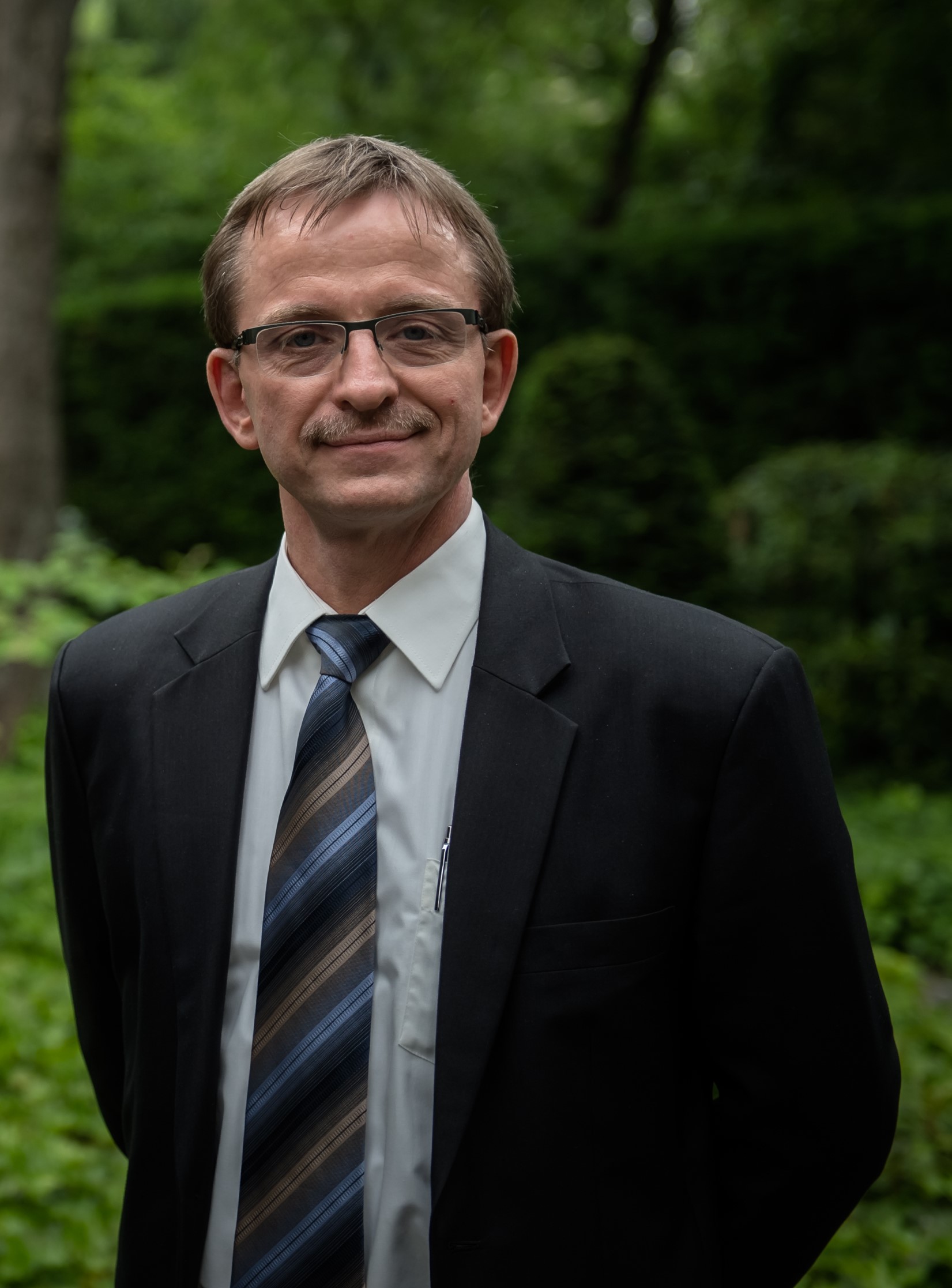
© Andreas Endermann
Professor Steffen Leonhardt, holder of the Chair of Medical Information Technology (MedIT) at the Helmholtz Institute for Biomedical Engineering at RWTH Aachen University, will moderate the new lecture: ‘Continuous In-Vehicle Health Monitoring Enabled with Multimodal Signal Fusion’ on 11 July 2024.
We are delighted to welcome Dr Joana M. Warnecke from the Peter L. Reichertz Institute for Medical Informatics at the Technical University of Braunschweig and the Hannover Medical School. Dr Warnecke will present her pioneering research into continuous health monitoring in vehicles. Her work focuses on the development of a redundant sensor system that enables reliable measurement of heartbeat and respiration rate. These systems use a Convolutional Neural Network (CNN) based architecture for data fusion and take into account additional sensors such as steering wheel angle and acceleration to improve signal quality.
“Our findings indicate that over half of the driving time can be utilized for in-vehicle heartbeat and respiratory rate monitoring, highlighting the efficiency and practicality of the proposed approach,”
states Warnecke.
This technology could make a significant contribution to the early detection of cardiovascular and chronic respiratory diseases by being seamlessly integrated into everyday life.
The ‘Colloquium on Biomedical Engineering and Related Areas’ is a regular series of events organised by RWTH Aachen University. The aim of the series is to provide an interdisciplinary education in these fields and to promote the interdisciplinary exchange of ideas. All students, clinicians, engineers and scientists are invited to attend this exciting lecture and exchange ideas with experts in the field of biomedical engineering.
The event will take place from 5 to 5:45 pm at the Helmholtz Institute for Biomedical Engineering at RWTH Aachen University, Pauwelsstraße 20, 52074 Aachen, Germany, seminar room 2.70. It will be coordinated by Prof. Dr. Klaus Radermacher, Chair of Medical Engineering, RWTH Aachen University. For further information please contact the secretariat at meditec@hia.rwth-aachen.de or call +49-(0)241-80 23870.
Excellent results at the Workshop Biosignals 2024
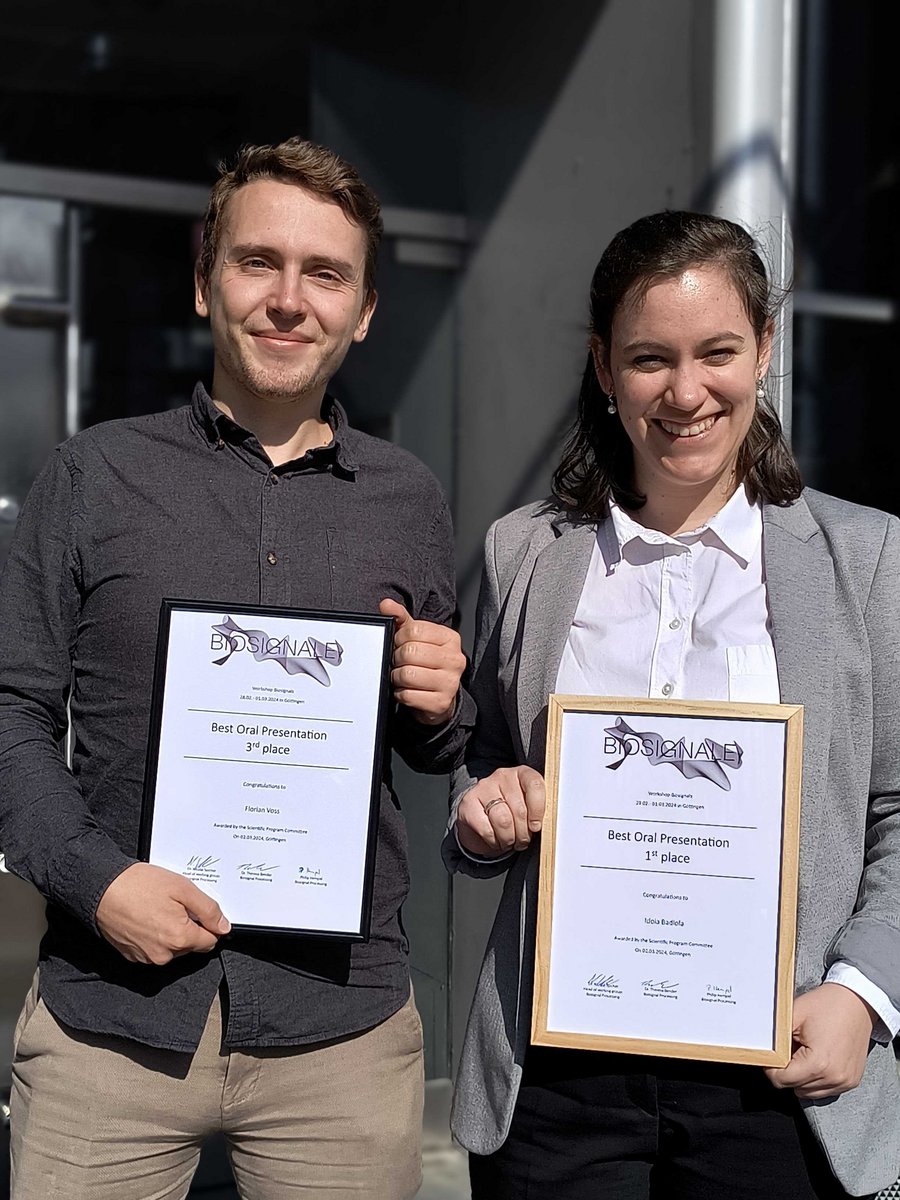
© Medical Information Technology (MedIT)
Idoia Badiola and Florian Voss from the Chair of Medical Information Technology (MedIT) at the Helmholtz Institute for Biomedical Engineering at RWTH Aachen University successfully participated at the Workshop Biosignals 2024, which took place from 28th February to 1st March in Göttingen.
The technical committees “Biosignals” and “Magnetic Methods in Medicine” of the German Society for Biomedical Engineering cordially invited all interested scientists, especially from the field of early career researchers, to the Workshop Biosignals.
Accepting the challenge Idoia was awarded the 1st place in the category “Best Oral Presentation” for her presentation “Mapping of peripheral venous hemodynamics using a low-cost camera: a proof-of-concept”. Florian achieved the 3rd place with his presentation “Camera Fusion for Improving Body Part Segmentation of Preterm Infants”.
“Congratulations to our colleagues Idoia Badiola and Florian Voss on their outstanding achievements”,
commented MedIT.
With this event, the committees are continuing a more than 20-year tradition of successful collaboration. Important components of the workshop were keynote speeches by young scientists as well as detailed poster presentations with short talks in which each submitted paper could be discussed constructively and critically. Submissions on biosignal analysis, biomagnetism and new related topics such as artificial intelligence and medical data science were welcome.
The event was hosted by the Biosignal Processing Group of the University Medical Centre Göttingen and supported by the Medical Image- and Signal Processing Working Group of the German Association for Medical Informatics, Biometry and Epidemiology.
“Special thanks go to the organisation team of the workshop, particularly Dr. Nicolai Spicher, Theresa Bender and Philip Hempel”,
added the Chair of Medical Information Technology.
Further information on the Workshop Biosignals can be found on the event’s homepage.
Find out more about the Chair of Medical Information Technology (MedIT) here.
Prof Leonhardt elected to the German Academy of Science and Engineering
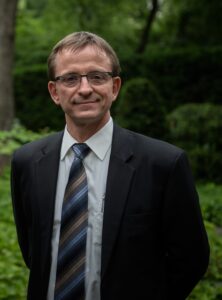
© Andreas Endermann
The German Academy of Science and Engineering, a prestigious private not-for-profit scientific academy, has recently welcomed 39 new members. Among them is Professor Leonhardt, Chair of Medical Informatics. This expansion of the Academy’s expertise strengthens its ability to provide valuable science-based advice to policymakers and society as a whole. Congratulations!
Established in 2002, the German Academy of Science and Engineering plays a crucial role in advising policymakers on science and technology policy. It operates under the umbrella term acatech, a combination of ‘academy’ and ‘technology’, and has a significant impact beyond national borders, representing the interests of German technological sciences at both national and international levels.
In June 2017, Federal President Frank-Walter Steinmeier became the patron of the German Academy of Science and Engineering, highlighting the institution’s dedication to promoting scientific and technological excellence.
We, at the Faculty of Electrical Engineering and Information Technology, are proud to congratulate Prof. Steffen Leonhardt on his election to the Academy.
Delegation visits IIT Madras
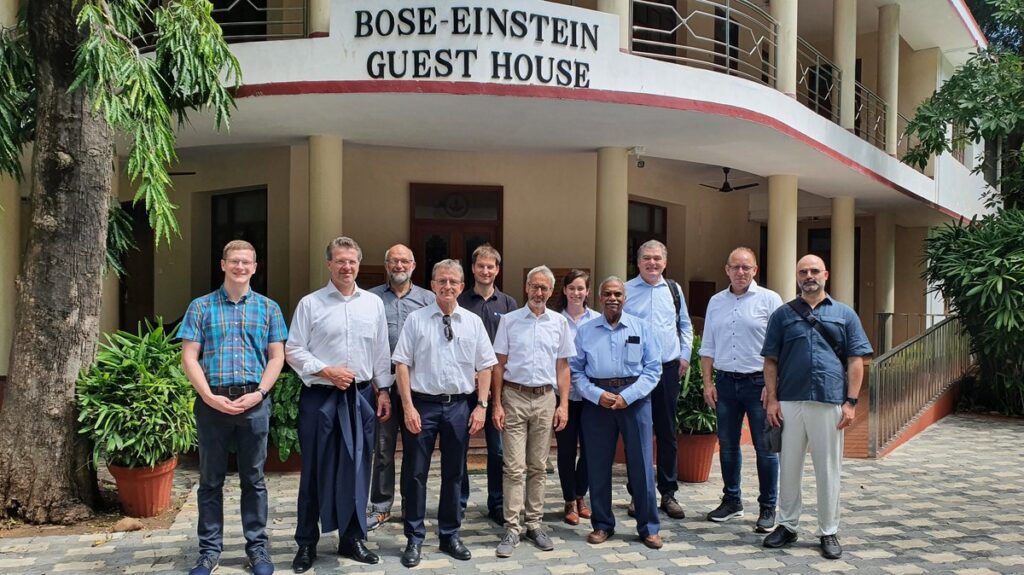
Professor Leonhardt and colleagues © MedIT
The Institute of Medical Information Technology (MedIT) on the road in Chennai, India.
Professor Leonhardt and his colleagues from MedIT and other RWTH institutes visited India in late September, specifically the Indian Institute of Technology (IIT) Madras in Chennai. The aim of this visit was to finalise the proposal for an Indo-German Graduate College.
IIT Madras is a premier university for engineering sciences in India, established in 1959 with assistance from the former West German government. The plans for this were arranged in 1956 during a meeting between Jawaharlal Nehru and Konrad Adenauer. The IIT Madras campus spans 2.5 sq km and has a dense forest. Previously, it belonged to the Guindy National Park. Conservation measures are in place for the campus where most students and staff also reside. A variety of wildlife, such as deer, antelope, axi deer, monkeys, snakes, and scorpions, can be found inhabiting the area.
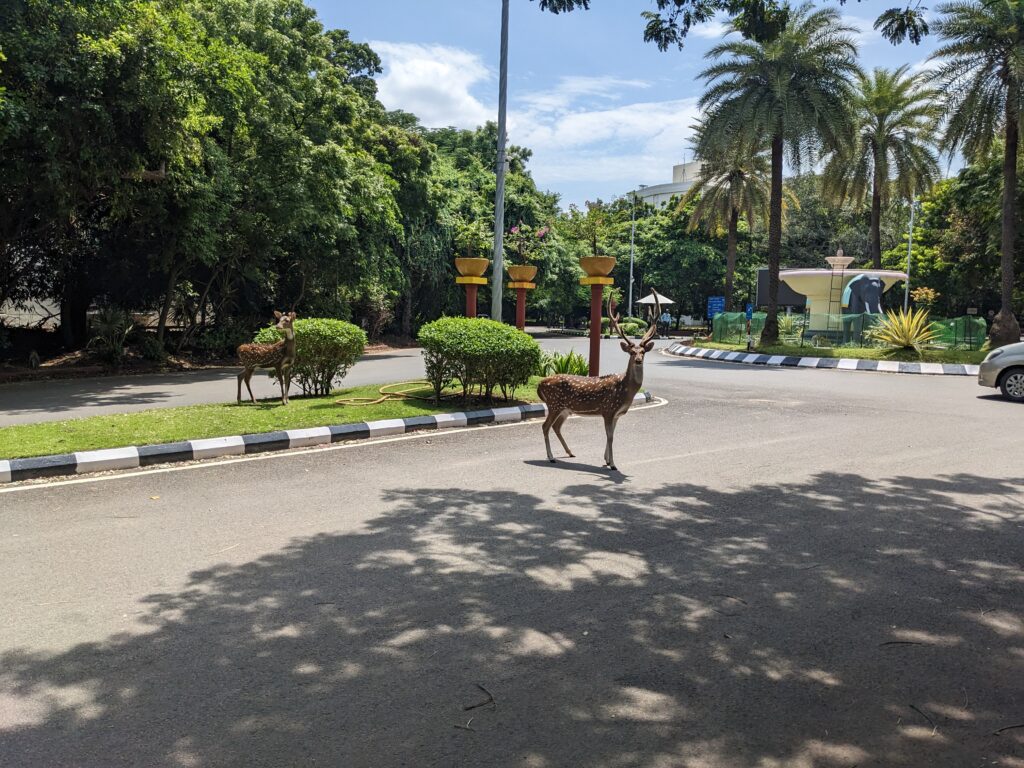
© MedIT
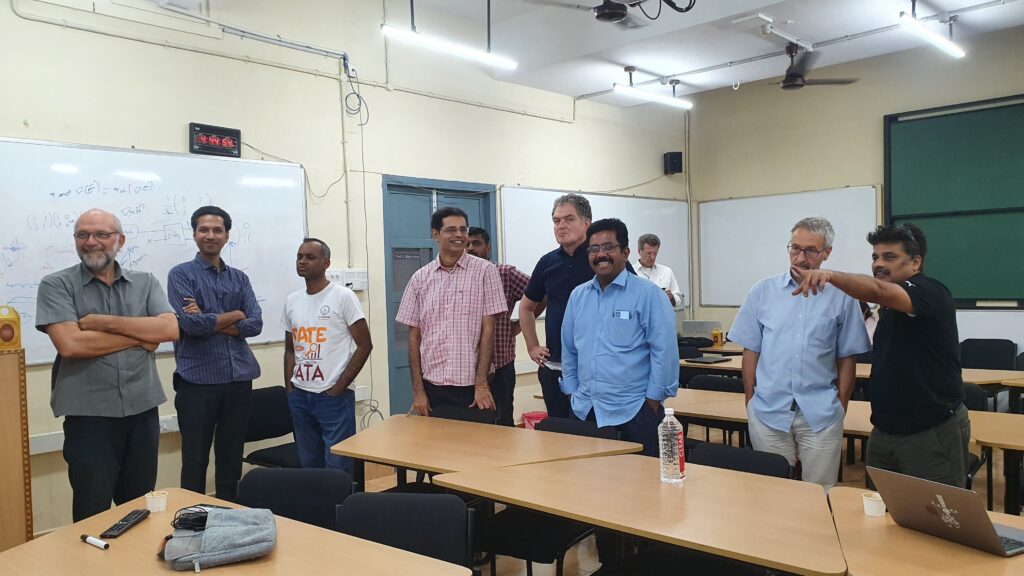
© MedIT
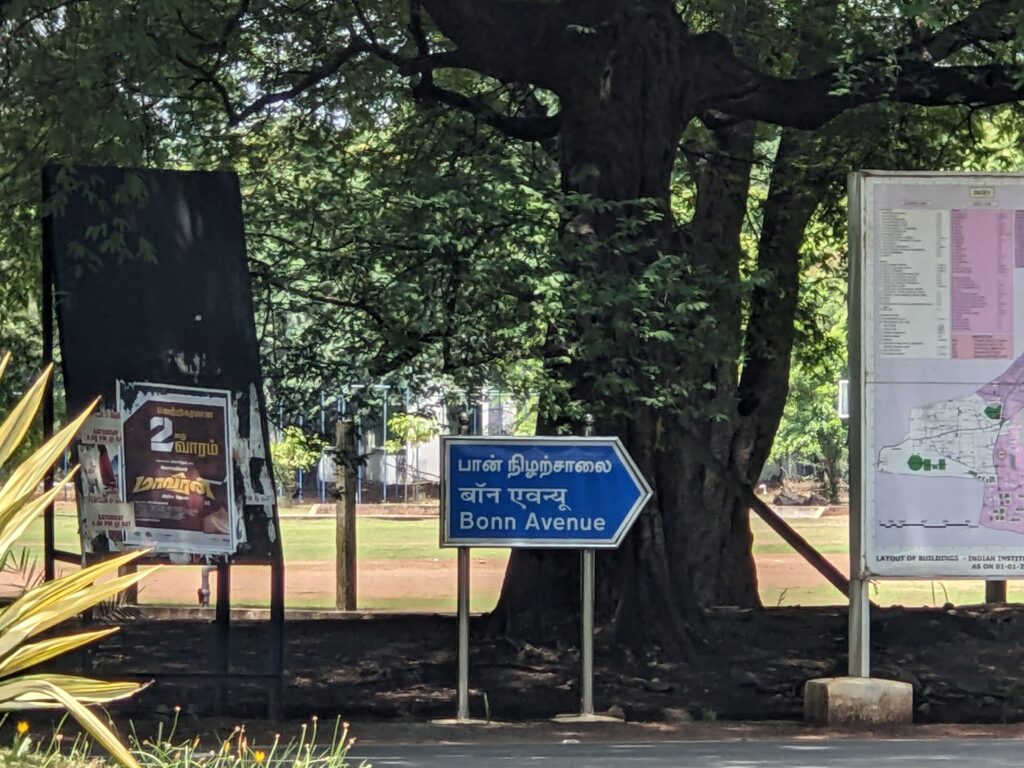
© MedIT
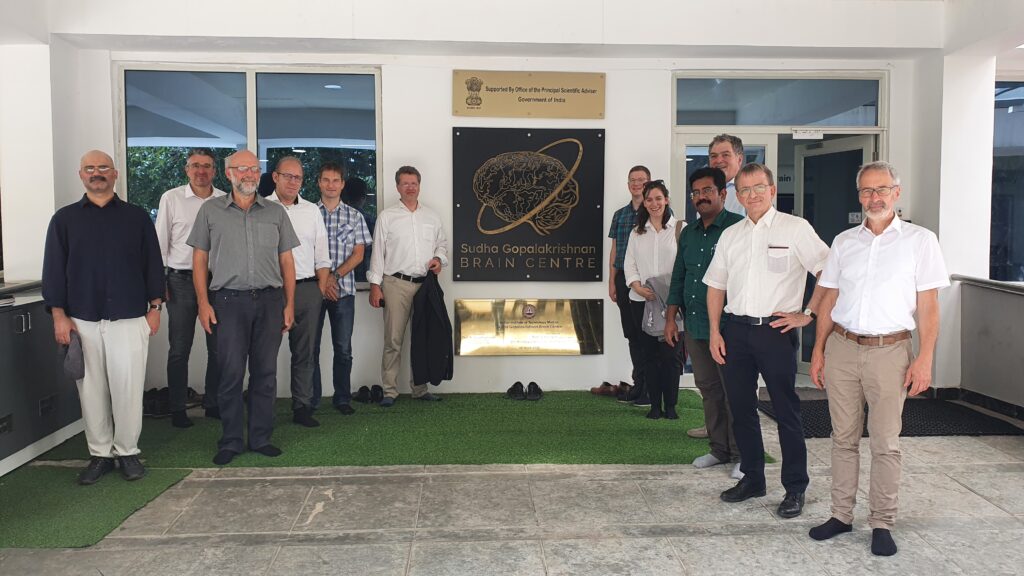
© MedIT
For more news, visit the MedIT website.
Writing Workshop E-Technology Winter Semester 2023/24

© Martin Braun
You are studying a bachelor or master subject at the Faculty of Electrical Engineering and Information Technology? The study or final thesis is now imminent? Then get the support of the Language Center and benefit twice!
The semester course in presence strengthens the subject-specific writing and text competence with customized writing advice. Practical workshops based on text examples from electrical engineering and information technology provide know-how on text structure, language, style and citation. The online expert feedback in the writing consultation helps to individually apply what has been learned in the course to the current project or thesis. Voluntary participation in an introductory course on technical subject research at the University Library is also offered as part of the course.
After successful participation, the Language Center awards a certificate and 3 CP, which are creditable according to the respective examination regulations.
International students must prove a German language level of at least C1.2 as a prerequisite for participation in the course.
Registration takes place via the user account at the Language Center.
Registration deadline: September 29 – October 10, 2023
Dates:
| Group 1 02.54478 |
Group 2 02.54479 |
|
Wed, 08.11.2023 Wed, 22.11.2023 Wed, 06.12.2023 Wed, 10.01.2024 each from 09.00 to 12.00 hrs |
Wed, 15.11.2023 Wed, 29.11.2023 Wed, 13.12.2023 Wed, 17.01.2024 each from 09.00 to 12.00 hrs |
Contact for queries: schreibzentrum@sz.rwth-aachen.de
60th Anniversary of the Institute of Hearing Technology and Acoustics
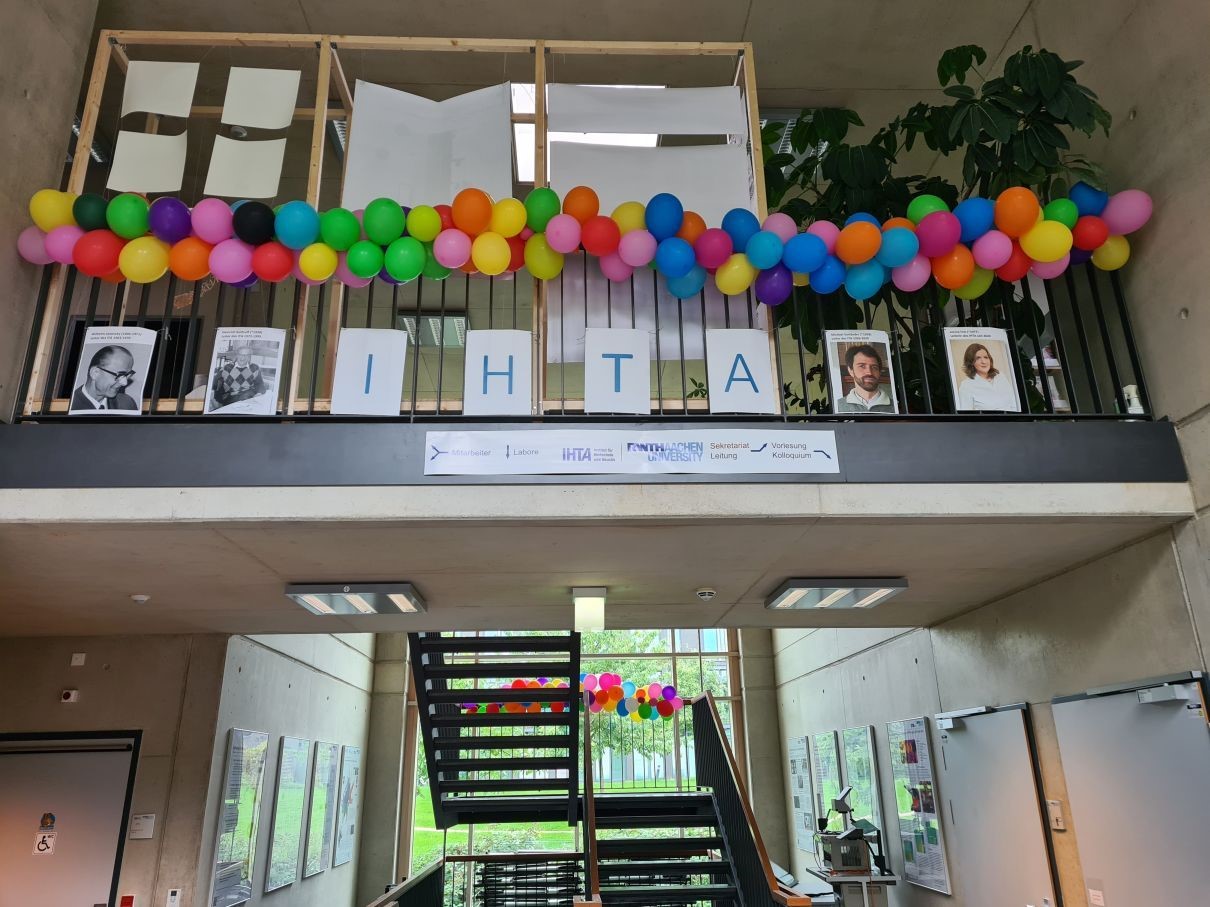
© Institut für Hörtechnik und Akustik
A special day for the Institute of Hearing Technology and Acoustics (IHTA/ITA), was created by all active and former members of the Institute on Saturday, August 19, 2023, when they celebrated its 60th anniversary.
The Institute of Technical Acoustics was officially founded on January 2, 1964 under the leadership of Professor Wilhelm Janovsky and since then has had an impressive history in the research and development of acoustic technologies and hearing techniques. Over the years, outstanding individuals have taken the helm of the Institute, including Professor Heinrich Kuttruff in 1972, Professor Michael Vorländer in 1996, and finally Professor Janina Fels, who has headed the current Institute of Hearing Technology and Acoustics since 2020.
The anniversary celebration drew more than 120 former and active members of the institute who joined in a day full of festivities and activities. The event featured tours of the Institute’s facilities and demonstrations of current research topics highlighting advances and innovations in the field of acoustics and hearing technology. Of course, food, drinks and live music by the IHTA band were not to be missed to round out the festivities.
Special thanks were given to the Association for Technical Acoustics (GfTA), which contributed significantly to the organization and realization of this anniversary celebration. The GfTA is an association that focuses on the promotion of acoustics in Aachen, especially with regard to young talent. It made it possible that the event became an unforgettable event and supports and strengthens the community of the former and active members as well as the new generation in the field of acoustics.
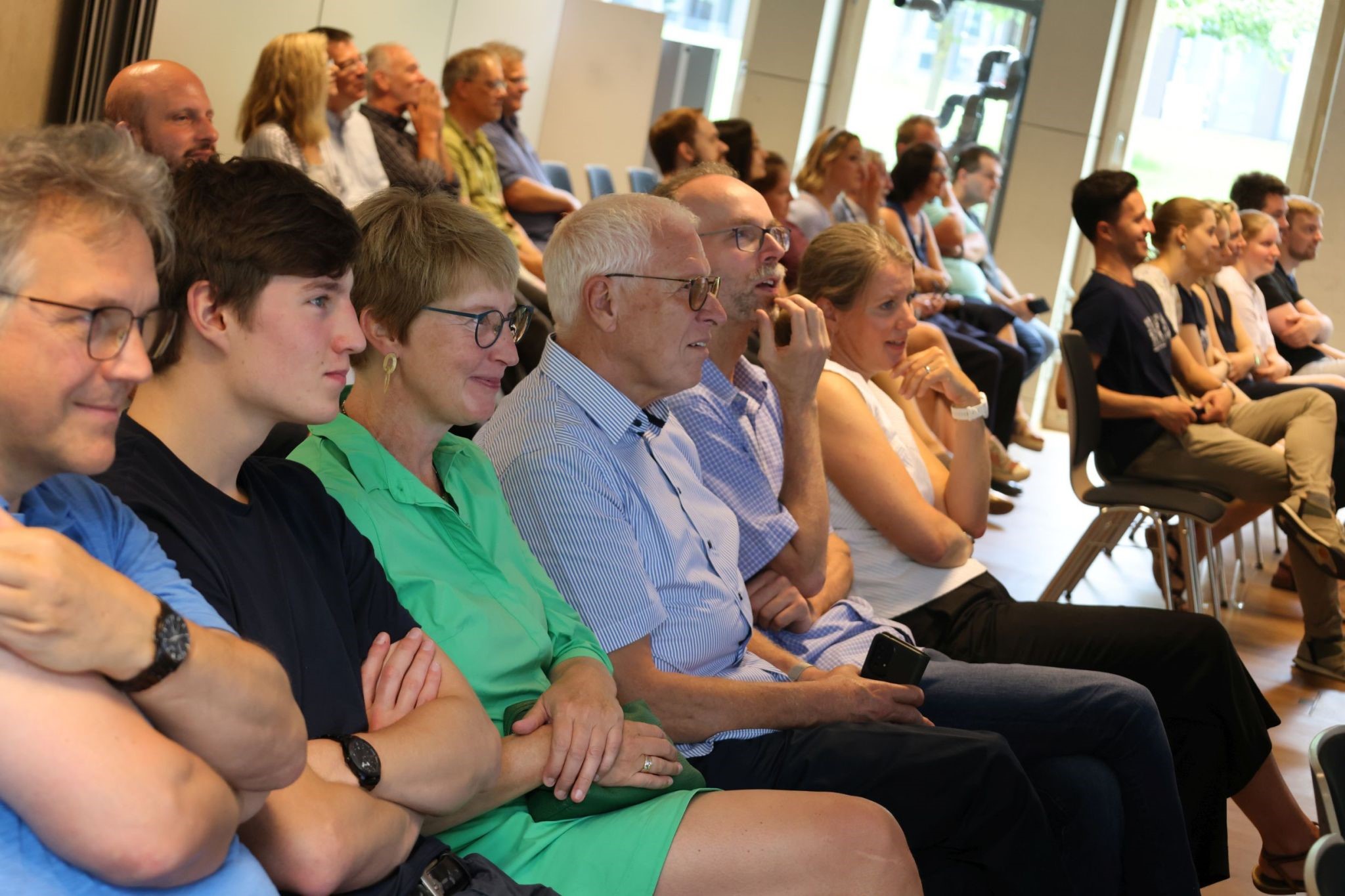
© Institut für Hörtechnik und Akustik
For more on the anniversary celebration, visit the Acoustics Blog. Their goals as well as further information about the Association for Technical Acoustics and all current news and research projects of the Institute of Hearing Technology and Acousticsare available.
First AUDICTIVE Conference 2023
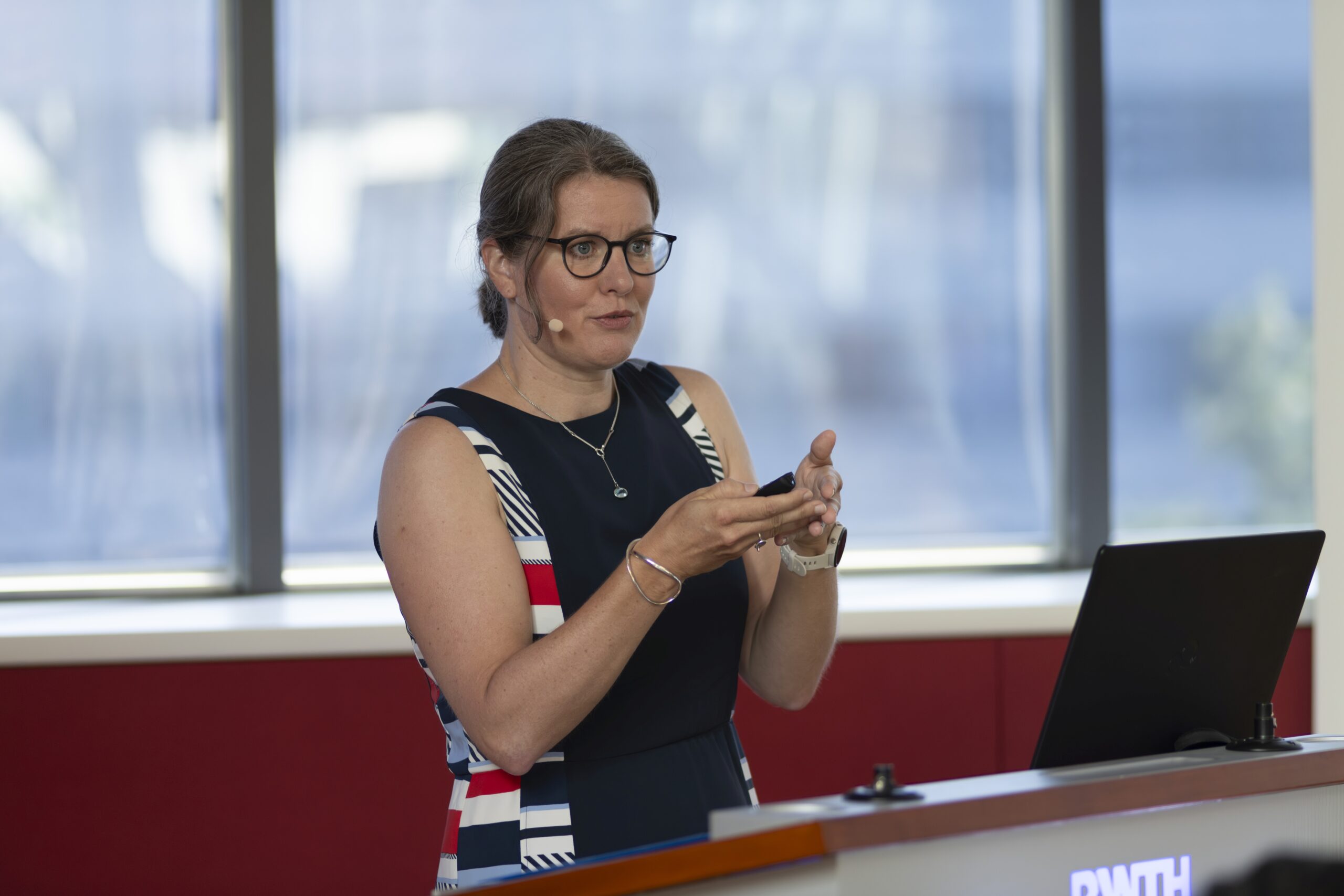
Professorin Janina Fels © Gottfried Behler, Janina Fels und Alexander Raake
A conference like a booster shot for the dynamics of basic research aiming to bridge the gap between auditory perception and cognition on the one hand and virtual reality on the other.
With recent developments in hardware and software technologies, audiovisual virtual reality (VR) has reached a high level of perceptual plausibility, which allows to overcome the limitations of simple laboratory situations. This creates good conditions to explore in a controlled way the ability to interact with a complex audiovisual scene – as a representation of an authentic life experience, for example, in a classroom, an open-plan office, or else as complex outdoor communication situations – depending on acoustic, visual, and other contextual factors. The applicability of the resulting scientific results in the immediate living environment, as well as their feedback for quality enhancement in interactive audiovisual virtual environments and quality assessment methods of the interface of the two disciplines are topics of the conference and the subject of research.
In response to these multidisciplinary challenges, university professor Janina Fels from the Chair of Hearing Technology and Acoustics at RWTH Aachen University invited researchers from the fields of acoustics, cognitive psychology and computer science to the first AUDICTIVE Conference from June 19 to 22, 2023. The goal here was to ensure interdisciplinary collaboration in basic research and to make possible synergy effects that cannot be achieved by a single discipline.
Currently, research efforts are mostly conducted separately within individual scientific research communities. This prevents cognitive psychology and acoustics from fully exploiting the enormous potential of VR to test and extend their existing theories in the more realistic, rich, and interactive virtual environments that can be created with the current state of the art in VR technology. At the same time, VR research can benefit from the knowledge of auditory perception and cognition to understand the important quality criteria that must be met to optimize user perception and cognitive performance, as well as subjective experience and (social) presence in a virtual environment. Due to the added value of the collaboration and research methods of the three disciplines, it is expected that research in the areas of hearing, auditory cognition, and VR can be elevated to a much higher level.
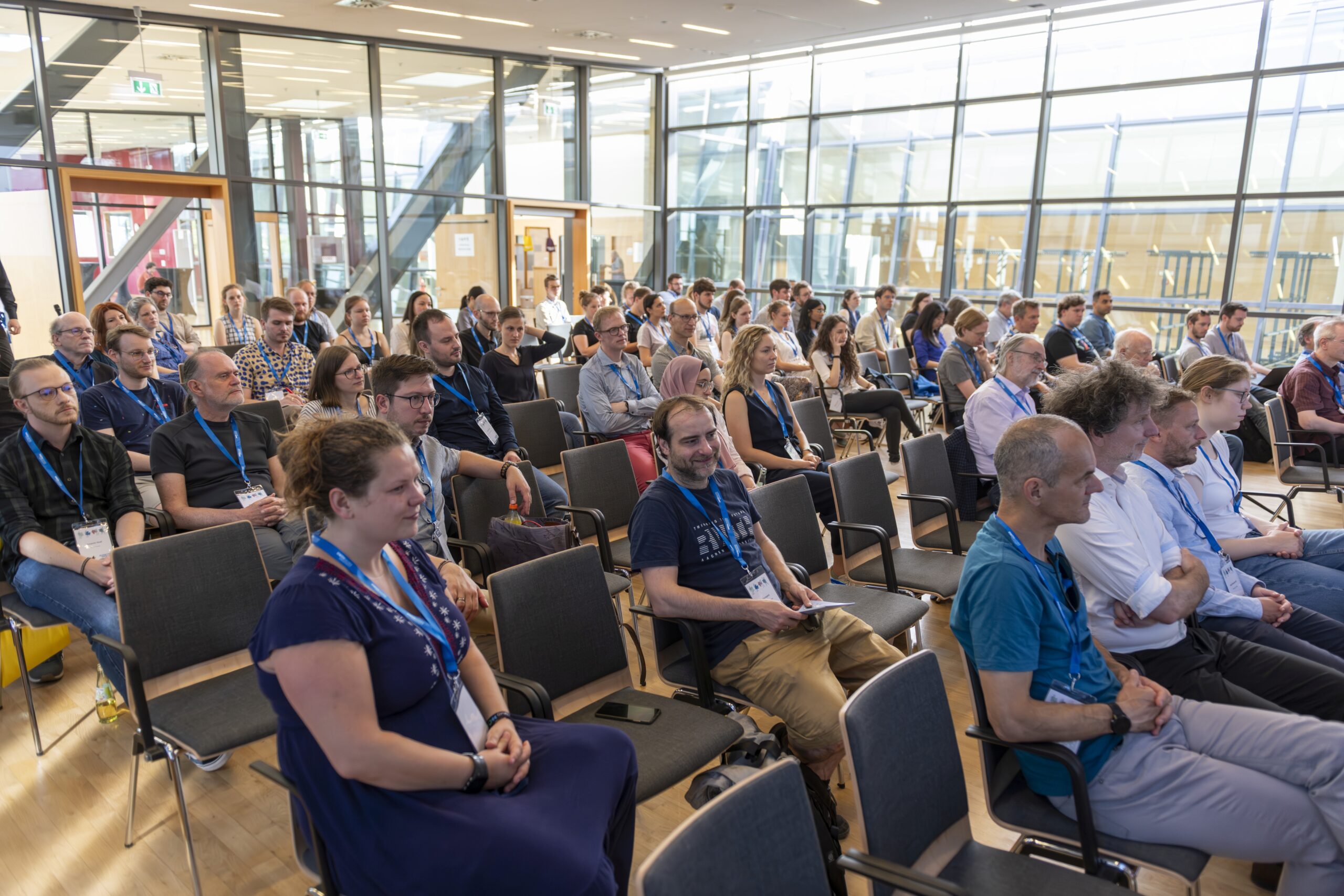
© Gottfried Behler, Janina Fels und Alexander Raake
The conference presentations offered fascinating insights into the future of human-computer interaction, auditory perception and virtual reality:
Professor Barbara Shinn-Cunningham of the Carnegie Mellon Institute elaborated in her presentation on how our brains perceive and evaluate the auditory world around us. It does this by using the interaction between voluntary top-down attention and involuntary bottom-up attention to focus on a speaker while processing new sound sources in our environment. In this talk, Professor Shinn-Cunningham explored how peripheral and central factors combine to determine communicative success, which is influenced by expected and unexpected sounds in everyday environments. She focused on the cortical networks that mediate competition for attention.
In his talk, Professor Frank Steinicke from the University of Hamburg presented the exciting development of the fusion of augmented reality (XR) and artificial intelligence (AI). He emphasized how these technologies enable seamless transitions between real and virtual worlds and have the potential to create immersive experiences.
Still, today’s immersive technology is decades away from the ultimate representation. However, the shortcomings of the human perceptual system, cognition, and motor skills can be exploited to bend reality to enable compelling immersive experiences. His talk presented several XR illusions that bring us closer to the ultimate fusion of intelligence and reality.
Professor Alexandra Bendixen from TU Chemnitz spoke about her research in auditory perception and sensing. She explained how she creates scenes with multiple interpretations and monitors listeners’ perception to investigate factors that stabilize auditory perception in ambiguous scenes. Recent combinations of auditory multistability with eye tracking have provided new insights into the interplay between auditory and visual multistability, with implications for our general understanding of scene analysis across all senses. When psychophysiological measurement logic is flipped, brain responses associated with sensory predictions can be used to evaluate certain aspects of virtual reality (VR), such as the appropriateness of VR latencies.
More information about the AUDICTIVE Conference is available on the official website.
MedIT looks back on 20 years of history

Happy Birthday!
Since the founding of the Chair of Medical Information Technology (formerly the Philips Chair of Medical Information Technology) on 01.08.2003, a lot has happened: new research areas have been opened up, international collaborations have been established, a branch office has been opened and many young PhD students have graduated here.
MedIT is grateful and proud of this development and would like to share it with old and new colleagues, partners and friends.
To mark this occasion, an anniversary celebration will take place in September 2023, which will also include a symposium in which MedIT would like to discuss the past and future of the chair as well as medical technology in Aachen and the world.
Further information on the lecture programme: Das MedIT feiert sein 20-jähriges Bestehen (rwth-aachen.de) (only in german)
Project Sacred Sound: a long-gone sense of life in long-lost spaces.
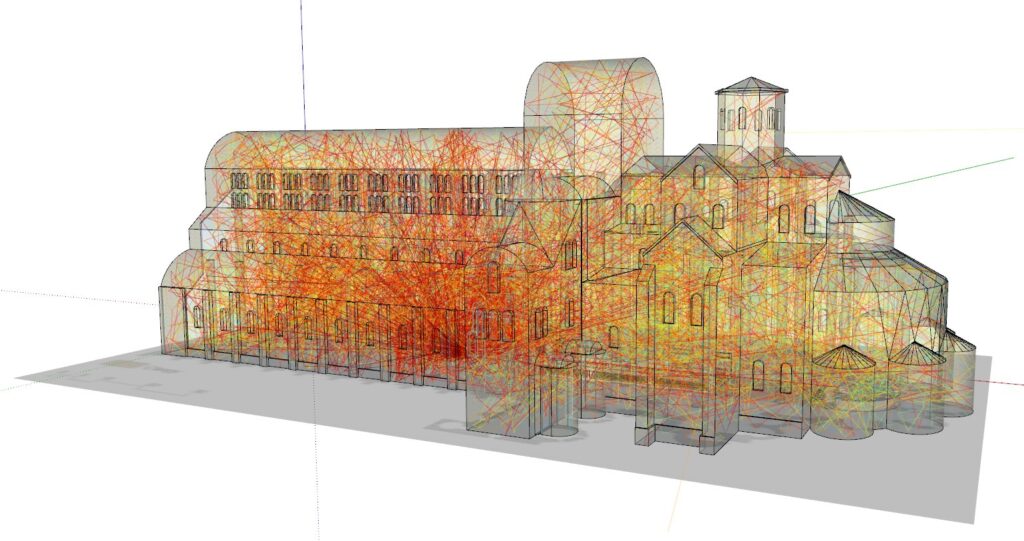
Ray tracing simulation in the acoustic 3D model of Cluny III (Image: Lukas Aspöck, CC-BY 4.0).
What was it like back in the Middle Ages? Experiencing history and feeling the spirit of the times – musicologist Professor Stefan Morent from the University of Tübingen, together with his project team and in cooperation with the Institute for Hearing Technology and Acoustics at RWTH Aachen University, is reconstructing the soundscape of this era. At the center of the music-historical experiment is the monastic church of Cluny III between 1130 and 1790.
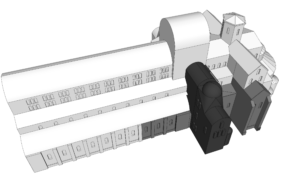
3D model of Cluny III. Black and dark gray parts show the still existing remains of the church (Image: Lukas Aspöck, CC-BY 4.0)
The Benedictine Abbey of Cluny was one of the most influential religious centers in Europe until the destruction of significant parts of the imposing building. Clergymen practiced their faith in its rooms: “Only through music and if the liturgy was performed flawlessly could a connection to God be established,” Professor Morent explains the monks’ conviction. But how did their singing sound in the spacious and magnificent halls?
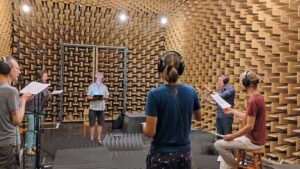
Ensemble Ordo Virtutum during the recording session in the anechoic half-room of the institute (Photo: Lukas Aspöck, CC-BY 4.0)
Cluny III is a virtual version of the historical original, which enables a room-acoustic computer simulation. For this purpose, medieval choral songs of the ensemble Ordo Virtutum were recorded in IHTA’s laboratory – an anechoic room without reverberation. In real time, the singers experienced the reflections of the virtually constructed church space via headphones. This auralization makes it possible to embed the musical compositions in the architectural-historical context of their creation. But what role does the interaction of architecture and sound play for future spatial concepts? To answer this question, the recordings will be analyzed from a musicological point of view in further project steps in order to investigate the influence of architecture on the musical performance.
Excellent placement in global university ranking
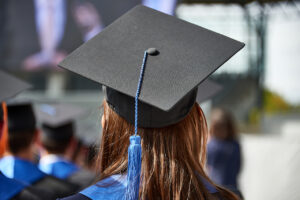
© Kurt Beyer
In electrical engineering, RWTH Aachen is one of the three best German universities. This is the result of the internationally highly regarded QS Ranking by Subjects of the British information service provider Quacquarelli Symonds. Presented in its latest version, the subject ranking is based on various criteria that are weighted according to subject. An online reputation survey among university graduates and employers accounts for between 40 and 100 percent of the total points and is considered the most important indicator. Citations, which scientific papers from universities receive on average, account for up to 60 percent. For some engineering and natural science subjects, international research networks are also taken into account.
The Aachen University of Excellence was able to place itself on the winner’s podium in many subjects throughout Germany and is also convincing in an international comparison. In ten subjects, it placed among the 100 best worldwide. RWTH did particularly well in the subjects of mining engineering with 15th place and mechanical engineering with 19th place.
For more information: www.topuniversities.com



